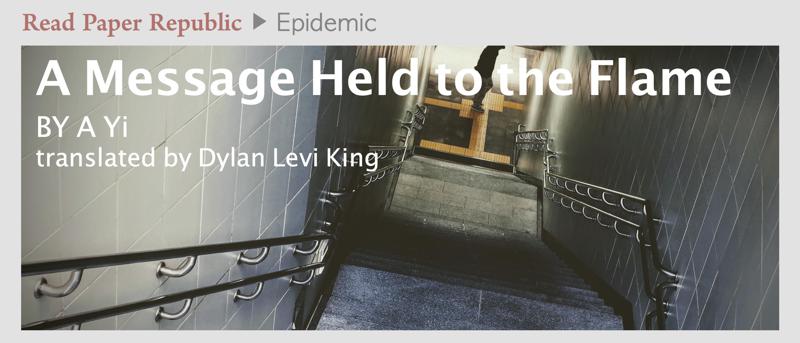Source: Paper Republic (4/23/20)
A Message Held to the Flame, by A Yi 阿乙: 《我们所处的人的环境》
Translated by Dylan Levi King

We are delighted to introduce this week’s essay on coronavirus in China, especially written for us by A Yi and translated by Dylan Levi King.
I lack the knowledge and scientific expertise to offer any opinion on the new coronavirus epidemic. I have been watching the numbers, trying to grasp what experts are saying, and observing the responses of various governments, but none of that has allowed me to form a clear, coherent conclusion. In my birthplace of Jiangxi, only one death has so far been attributed to a case of pneumonia related to the coronavirus. In Fujian, too, the death toll stands at one. I don’t know whether those low numbers are due to particularly effective local efforts to fight the virus, the epidemic striking those two provinces with diminished ferocity, or a combination of both factors. Someday, I am sure, objective conclusions will be reached on the epidemic.
I’ve felt the stress that everyone is under. It reminds me of Werewolf, the classic social deduction game that divides players into “innocent villagers” and “werewolves.” The “werewolves” are provided with the identities of their fellow players, but the “innocent villagers” are given only the number of werewolves. When I played in the past, I would often ask myself: what would it be like to live according to the logic of the game? How would things turn out? Unfortunately, in this epidemic, we’re playing the role of “innocent villagers,” waiting for the “werewolf” to appear from nowhere and murder us. In a situation like this, some people turn into something that barely resembles their previous selves—perhaps it is more accurate to say that their true natures emerge. Fukasaku Kinji’s film Battle Royale (2000) dramatizes exactly this process, showing what happens when a game turns into a life and death struggle.
The hazards and dangers of our games have been made very real by the epidemic. By simply riding together on public transportation, we might transmit the virus or be infected by it. What makes that even more frightening is the possibility that the person transmitting the virus might not show any signs of infection, and that the person infected might themselves remain asymptomatic. In a situation like that, where everyone is at risk, we have the chance to see how people truly treat themselves and others. There is no playing it close to the vest; we must all lay our cards on the table. For some, that has meant exposing to the world their private fears. I am thinking of the folks from a residential compound in Nanyang City, Henan, who prevented neighbors—nurses at a nearby hospital—from returning home after work, fearful that they would spread the disease. There were also a number of cases where paranoia about the potential arrival of Hubei residents drove people to destroy the roads into their villages. That fear and paranoia led to a Hubei truck driver being trapped on the side of the highway for close to a month after he was turned away at a roadblock and denied entry to rest stops. The truck driver was made overnight a refugee in his own nation. This anxiety has even reached my own residential compound, where anyone entering the gates must submit to having their temperature taken and show a pass card authorizing their visit. When iron spikes were installed on the tops of the walls, I thought that the efforts to keep people out had gone too far, but then I came to find out that many of my fellow residents had asked for exactly those steps to be taken. I had come to a similar realization about the security checkpoints set up at the entrances to the subway: the increased security was a government initiative, but it had the full support of many citizens. Health and safety have begun to justify many things.
Paranoia and anxiety are not the only things that have been revealed, though. Many have revealed a decency and honor that would usually stay private. I am talking about the doctors, journalists, volunteers, philanthropists, delivery drivers, and shop owners that have continued marching forward with nobility and integrity. They deserve our respect.
In The Ballad of the Sad Café by Carson McCullers, there is a line that goes: “It is known that if a message is written with lemon juice on a clean sheet of paper there will be no sign of it. But if the paper is held for a moment to the fire then the letters turn brown and the meaning becomes clear.” I realize now that over the past twenty years, I have never really understood the people that surround me. This epidemic is like a strip of litmus paper, revealing to me what has been hidden in the hearts of those people. I have come to understand exactly what sort of citizens this nation has fostered, what sort of children our parents have created… I believe that this epidemic will be a chance for us to learn more about the people that we share our space with; I believe that through this epidemic, both the government and individuals will gain a better understanding of how we might deal with each other.